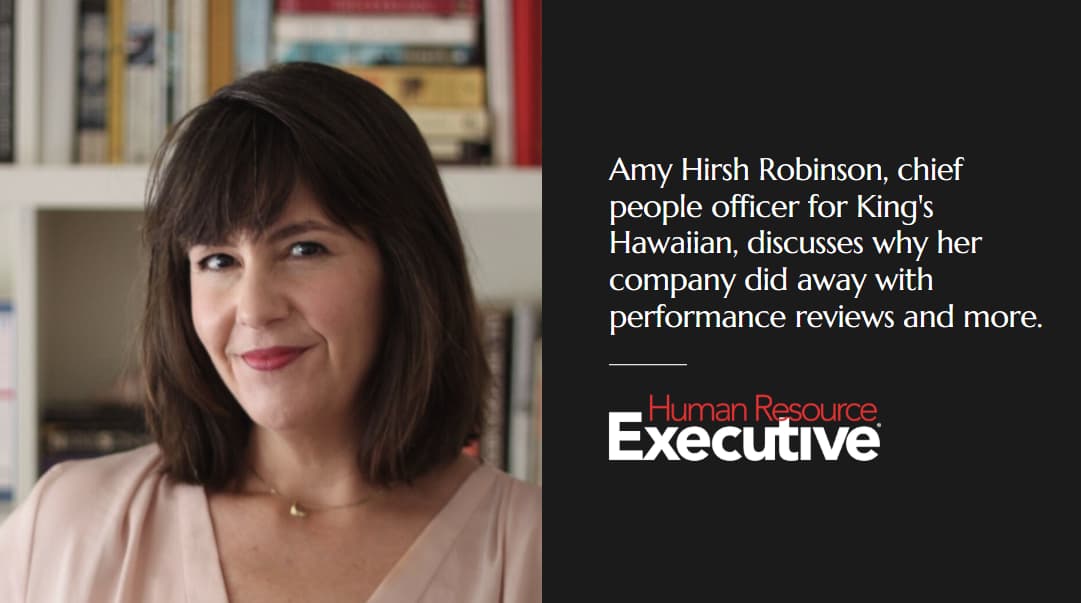19% of marketers say generating leads is their top goal in 2023.
However, building an effective lead generation strategy is often easier said than done. To do it right, you need an in-depth understanding of tried-and-tested channels.
In this post, you’ll gain insights into each major channel for B2B lead generation, including social media, PPC, blogging, and email. Best of all, you’ll learn effective strategies and impressive real-world examples for each.
Let’s dive in.

Table of Contents
What is B2B lead generation?
B2B lead generation is the process of bringing prospective customers to your organization. These leads should be potential buyers who would benefit from your business’ product or service.
The types of leads generated vary by campaign and marketing platform. Disciplined B2B marketers understand the different dynamics, budgets, and expectations typical of each lead generation channel.
Learn more about B2B lead generation in the video below.
Social Media Marketing Strategies
Social media is a critical component of B2B marketing. In fact, 36% of B2B marketers determine which social media platforms to leverage based on their lead generation potential.
Here are the most popular social media channels for B2B marketers:
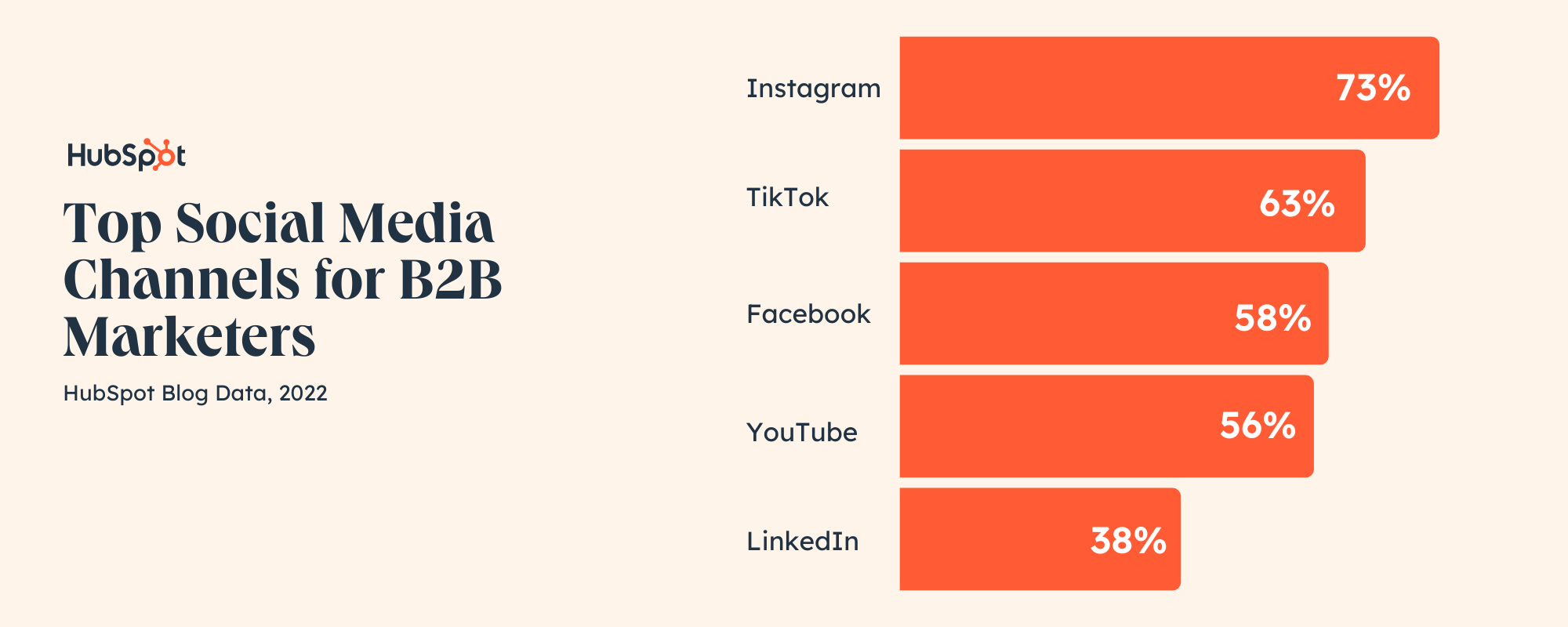
Here’s how your team can perfect your social media strategy.
What is the conversion rate of social media?
While there’s no single answer for B2B social media conversion rates, there are some calculated assumptions you can use to gauge efficacy. For B2B companies, social media conversion rates fall around 1.55% on average, according to 2021 research from Ruler Analytics.
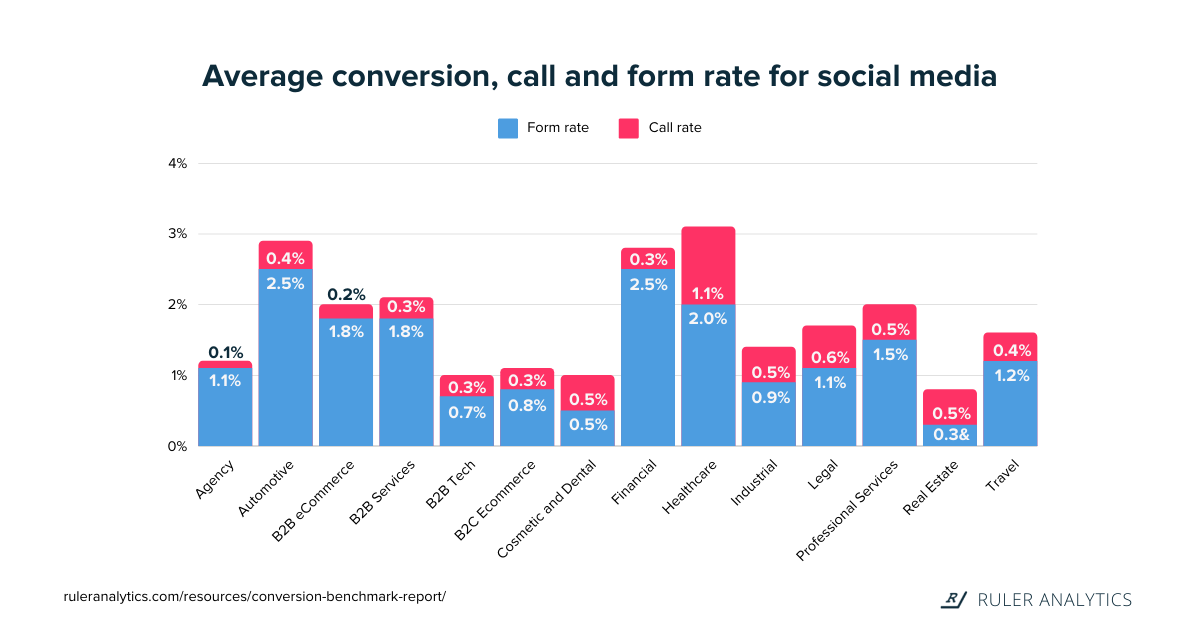
Image Source
While social media is an important means of generating leads, these platforms have a lower conversion rate compared to other B2B digital channels. Ruler Analytics found that social media had the lowest average conversion rate for B2B companies when compared to paid marketing, organic search, email marketing, and referrals.
Remember: Social media is an important channel for top-of-the-funnel awareness. Even if you see higher conversion rates elsewhere, social media can keep your brand top-of-mind for potential buyers.
To increase conversion rates, focus on promoting helpful content behind lead capture forms. For example, you might promote a downloadable ebook to capture quality leads with an initial offer.
There are two main channels you should focus on:
- LinkedIn Ads.
- Facebook Lead Ad.
Let’s dive into each of these primary B2B social media channels now.
LinkedIn Ads
It’s no surprise that LinkedIn, the go-to B2B social network, has above-the-board figures when it comes to social media conversion. In fact, 38% of B2B marketers leverage LinkedIn.
.png?width=2000&height=800&name=B2b%20lead%20gen%20LinkedIn%20(1).png)
However, investing your energy in a channel with high engagement rates doesn’t automatically guarantee success. On LinkedIn, you must:
- Target your audience based on buyer persona.
- Make sure your ads have a newsworthy, topical angle.
- Continuously test CTAs, images, and copy.
Pro tip: LinkedIn can be a helpful platform to display social proof. Consider sharing testimonials or case studies. Potential customers can then see which brands in their network you’ve already helped with your offering.
You can learn more about the nitty-gritty of LinkedIn Ad strategies from this LinkedIn-HubSpot 2-week free course.
Facebook Lead Ads
More than half (58%) of B2B marketers leverage Facebook. Using Facebook lead ads in your marketing strategy can help you navigate the shift to mobile.
Facebook lead ads allow your prospects to sign up for offers inside a mobile interface. These ads also allow you to generate leads generation inside the world’s largest social media channel.
Designed to be both targeted to your audience and highly customizable, Meta launched this service in 2015. Customers can now sign up for your offer in just two taps, without leaving the social network.
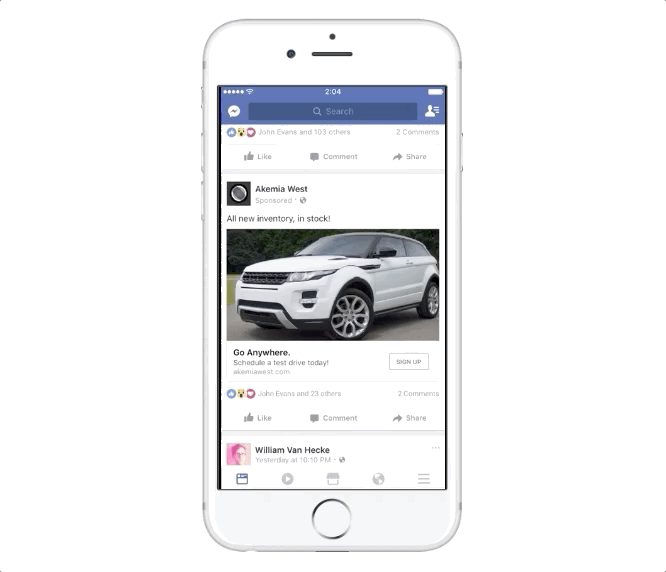
Image Source
Remember: Facebook lead ads aren’t designed to replace your landing pages. While Facebook Lead Ad helps you capture leads inside Facebook, your landing pages are still necessary for capturing leads from organic search and PPC.
For more details, check out this step-by-step procedure on how to create Facebook Lead Ads.
Tip for Running Great Social Media Lead Generation Campaigns
Case 1. Using Scarcity and Exclusivity
When we believe something is in short supply, we’re willing to pay a premium for it. This is known as the scarcity principle.
Virgin Active South Africa used scarcity (a limited-time offer) to increase the value of their offer. Their slogan — “Is summer ready for you?” — rings of seasonality. The question, along with the related offer, is only for the summer season.
What we like: In addition to seasonal messaging, the accompanying image emphasizes summer fun. The key messages and CTAs are also clearly highlighted.
Image Source
Case 2. Giving Before You Get
DigitalMarketer doesn’t sell — it gives something valuable away for free. That’s a compelling deal. By creating a clear value proposition, leads are more likely to share information with DigitalMarketer.
Their image amplifies the message and the CTA is clear but subtle. DigitalMarketer hooks leads through the law of reciprocity, which makes users feel they should return the favor through a later engagement.
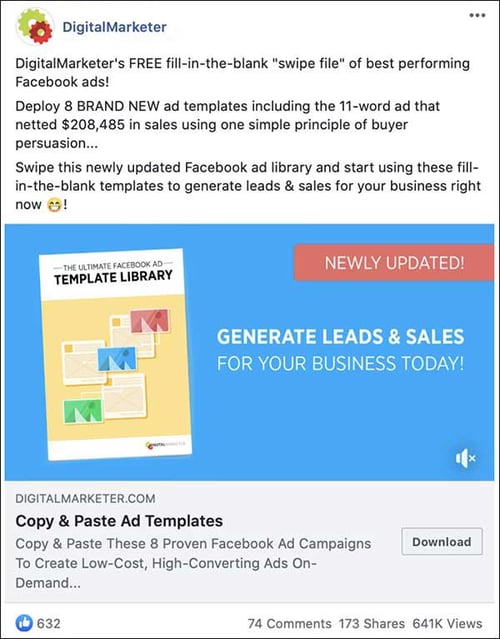
Image Source
What we love: Digital Marketer’s copy emphasizes how templates can both save time and generate sales. Find ways to demonstrate your value ad to entice leads to your offering.
Case 3. Finding the Right CTA
Your call-to-action should be enticing and tell readers exactly what will happen when they click. The phrase “Book Now” creates a sense of urgency. The viewer feels like they should book their ticket for the Van Gogh event before time runs out.

Image Source
What we love: This ad describes the art installation in the text and shows the experience visually. The viewer can picture the experience in their head when they click “Book Now.”
PPC Lead Generation Strategies
Pay-per-click (PPC) lead generation campaigns focus on a wide range of paid advertising platforms — the most popular being Google AdWords and Display Network. However, you’ll find a wide range of PPC lead generation options outside of Google, including:
- B2B review directories or comparison sites.
- Trade media display ads.
- Social media advertising.
- Affiliate marketing.
What is the conversion rate in PPC lead generation?
Adwords conversion rates fall around 2.41% for B2B companies, according to 2021 data from WordStream. Meanwhile, display conversion is averaged at 0.77%. However, rates vary depending on your industry.
It’s important to know your industry benchmarks. A good starting point is to ask each PPC vendor for their average conversion ratio across the board. This lets you evaluate your campaign results better.
Should PPC replace organic marketing? No — they complement each other. For instance, many high-value keyword searches have only PPC ads above the fold like this.
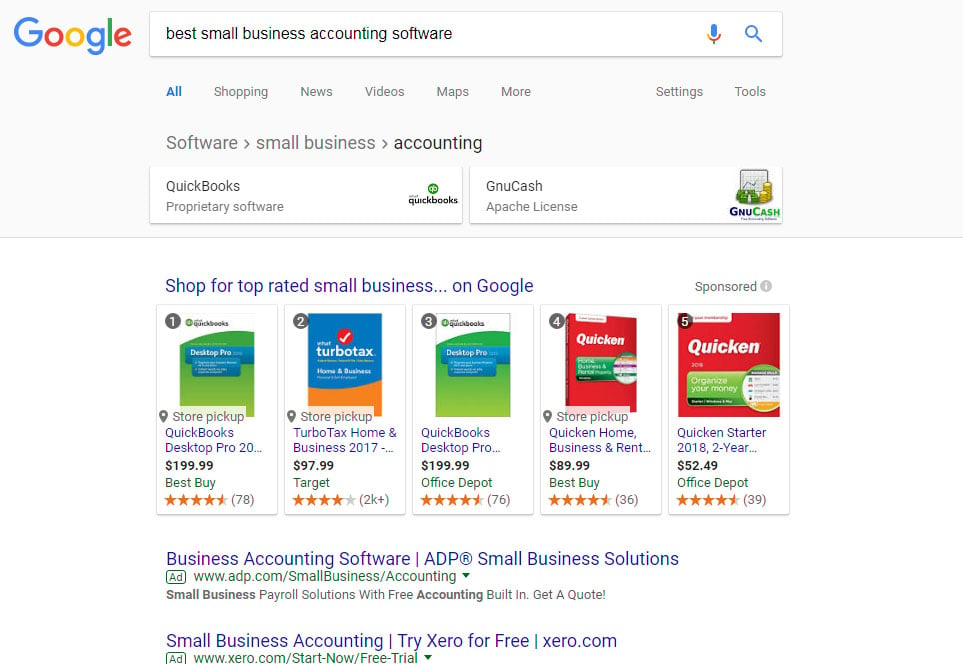
In other words, even if you have a good organic ranking, it may be buried under PPC ads.
An Example of an Efficient PPC Lead Generation Channel
Among the PPC platforms mentioned above, B2B review directories and comparison sites can provide a uniquely fresh lead source. Other PPC channels are likely already saturated by big players in your space, the ones with deep pockets.
For instance, in SaaS, a highly competitive industry across verticals, AdWords bidding is highly competitive. To win, you’ll need to target a lot of relevant keywords. Sometimes competitors even bid for keywords against your own brand — like this example, where Netsuite ranks higher for “Intuit Accounting.”
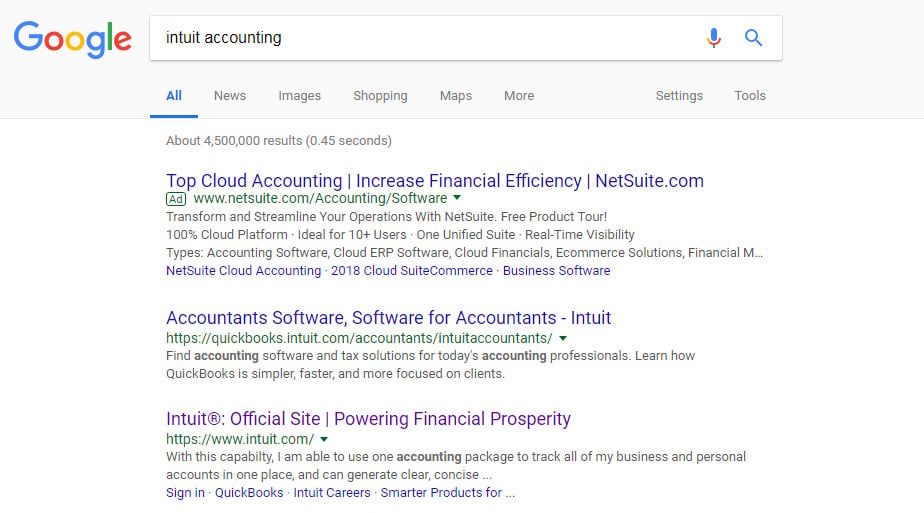
For many SaaS startups and SMBs, having another lead source like B2B review sites provides the option to meet and even surpass monthly lead quotas.
Let’s take a closer look at which popular marketing tools are used for lead generation by such sites. For example, here’s what FinancesOnline, one of the top software review platforms, offers:
- Lead generation campaigns: The review site can link directly to a vendor’s sign-up landing page, encouraging people who read your review to try out your free trial next. These campaigns can generate as much as a 24% conversion rate.
- Premium placement: In an increasingly commodified SaaS category, like a CRM where features are more standardized than unique, being included in a premium placement can make or break your sales opportunity. You have a much higher chance of attracting new leads if you’re listed among the most popular solutions, as prospects will usually only try out a few products. Make sure you get on such a list, because your competitors are probably already there.
- Industry awards: When buyers are comparing your product to your closest competitors, having your product stand out thanks to a featured quality award can have a critical impact on your sales. FinancesOnline, like many other review platforms, can give your product an edge with such awards.
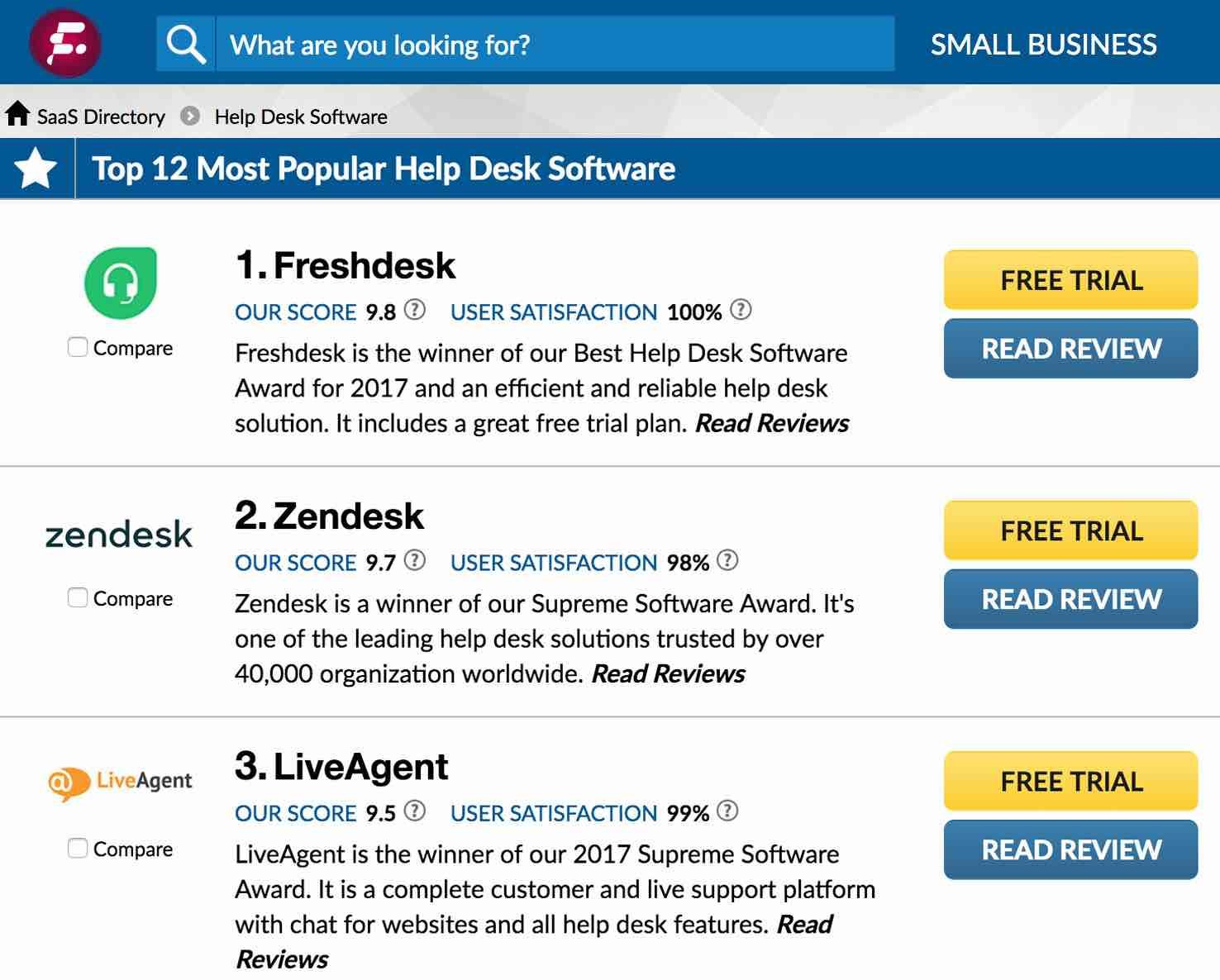
Image Source
Look for a third-party online marketplace in your industry, and get in touch with these intermediaries to ensure your product is listed.
Blogging Lead Generation Strategies
Blogging is at the core of content marketing. This strategy focuses on creating content that is interesting or valuable to your defined audience. The goal is to attract and sustain online engagement for leads down the road.
A lot has been said about the benefits of business blogging. Let’s reiterate the major benefits.
- You can drive traffic to your website. With the right SEO planning, your blog gives you search presence, linking you to keywords relevant to prospects. Every blog post you write is one additional indexed page that helps get your content on Google.
- You can convert traffic to leads. A well-placed CTA in a compelling blog post can direct prospects to your landing page for leads.
- You can gain repeat business. A blog can delight existing customers with fresh content for repeat business or referrals.
Blogging also establishes niche authority and places prospects within your sphere of influence. Blogging is a large part of the HubSpot Strategy. Just search “inbound marketing” or its derivatives, and you’ll come across HubSpot consistently.
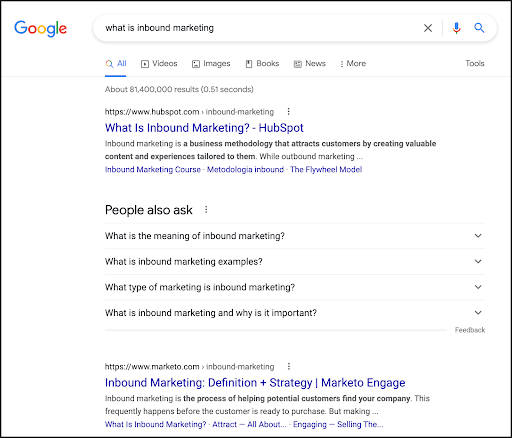
How effective is blogging in the long run? At HubSpot, about 90% of the leads our marketing team generates each month come from blog posts that were published many months — or sometimes years — ago.
Which content types drive lead generation?
If you’re planning on just writing a blog or only working with video, you’re out of luck. Robust content marketing strategies use a variety of formats to engage their audiences. Video, blogs, and images are among the top media that marketers use.
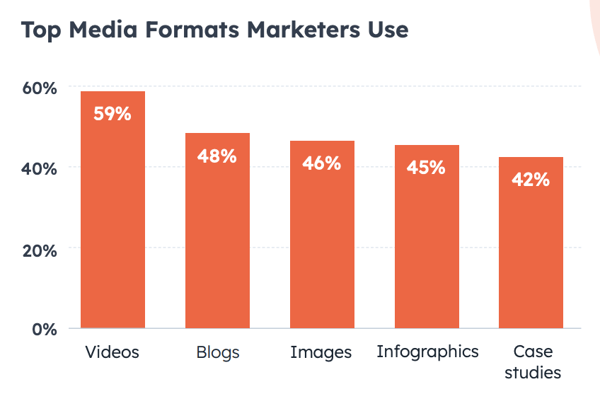
When building your content marketing strategy, consider including the following content.
- Authoritative posts are blog posts about subjects you’re an expert in. Readers should leave understanding with a better understanding of the topic at hand.
- Solid opinion pieces can help you spread brand awareness. However, this shouldn’t just be your ideas and thoughts. Persuading option pieces are backed by data and research.
- Original research is commissioned for industry consumption. Focus on questions that have yet to be answered or data sets that need a refresh.
- How-tos provide tips and tutorials to address prospects’ problems. By the end, they’ll have their issue resolved and you to thank.
- Trending content can help you capitalize on popular topics. Have any headlines and trends been related to your business? Consider a blog post that connects the dots.
- Infographics turn information into digestible visual bits for easy consumption. Encourage your audience to share these images where applicable.
- Videos on the upswing in content marketing. In fact, 72% of prospects prefer to watch a video over reading about a product. If your company does not have video talent in-house, consider contracting a team to help you produce this content.
Remember: These content types are most effective when they align with your marketing goals. In short, the hard work is still on you — you have to develop topics that are lead magnets to your audience.
Examples of Great B2B Blogging Campaigns
Case 1: Running Your Blog Like a Media Pro
HubSpot is influential when it comes to inbound marketing. But it didn’t happen by accident — HubSpot’s marketing team works hard to run its blog as a media site with a full editorial calendar.
HubSpot’s blog publishes tips, listicles, ideas, inspiration, insights, reports, ebooks, white papers, videos, and more. All of this content relates to inbound methodology across its niche segments in marketing, sales, website, and service. The blog even outperforms entrenched business media like Forbes and CNN Money in SERPs about inbound marketing.
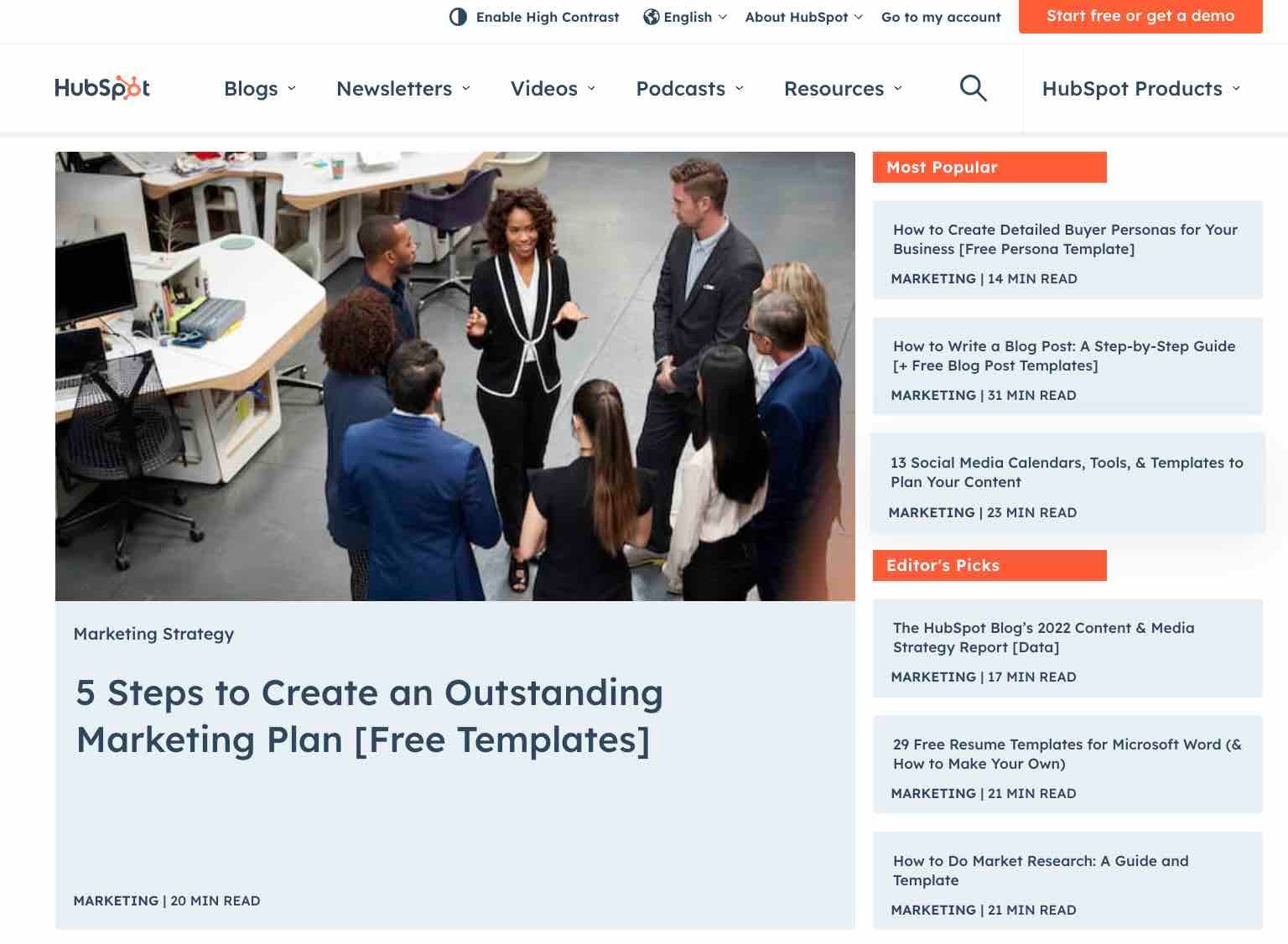
Image Source
Case 2: Knowing Your Audience
FreshBooks is clear about its target audience. In fact, the first step to having great content is to know your audience (your “Ideal Customer” personas). For FreshBooks, this means delivering “actionable insights into all aspects of running a small business.”
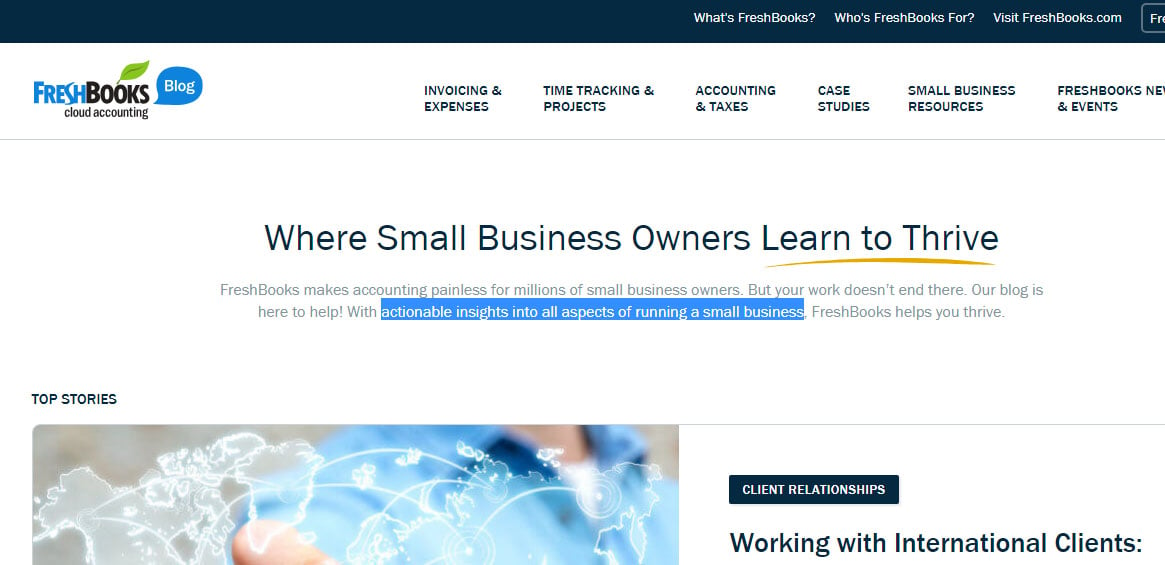
Image Source
Case 3: Leveraging Thought Leaders
Have any die-hard supporters or thought leaders in your base? Have them put their insights and opinions about your industry in your blog posts.
Your thought leader should be writing regular posts to leverage SEO and brand association, both of which can result in more leads down the road.
Email Marketing Lead Generation Strategies
A staggering 90% of B2B marketers say email marketing is either very effective or somewhat effective for reaching their goals, according to 2022 HubSpot Blogs report.
Email is often the bridge between marketing automation and CRM, two cloud solutions most widely used by marketers today. The email opt-in is still the starting point of lead generation and email marketing is the core of lead nurturing.
The advent of automated lead scoring, predictive analytics, and AI algorithms only reinforces email marketing with laser-focused, personalized touches, and real-time delivery.
For instance, HubSpot users can automate their email campaigns and move their prospects further down the funnel to generate more leads. This doesn’t require any coding skills — in fact, it’s as simple as setting up certain triggers that will send your emails to the right leads at the right time. Take a look at the video below:
In short, email marketing is still one of your best tools to engage intent signals, distribute content, and deliver pitches.
What is the conversion rate of email marketing?
You’re looking at two variables when it comes to email marketing:
- Open rate.
- Click-through rate (CTR).
A GetResponse study puts the overall email open rate average at 82.20% and CTR at 21.69%. The report further divided the figures by location, with North America at a 23.53% open rate and 3.86% CTR.
By industry, internet marketing has a 14.97% open rate and 1.66% CTR, as of 2022.
Meanwhile, Marketing Insider Group puts email marketing conversion into another perspective: You earn $44 for every dollar spent on email marketing. The consensus is, yes, email marketing has one of the highest conversion rates, corroborating the DemandWave findings above.
Which factors influence email marketing conversion?
It takes creativity to brainstorm your content or offer, but with that aside, email marketing is more of a science. You can measure it, analyze it, and improve it. Here are the key factors that affect your email marketing conversion rates:
- Value offers. You must have a lead magnet to attract email sign-ups, whether it’s value content, freebies, deals, or anything that is interesting to your audience.
- Landing pages. Optimize these pages by having a clear offer of your lead magnet, compelling CTA, permission, and appealing visuals.
- Email subject lines. Keep your subjects short, crisp, and compelling with clear benefits to the recipient.
- Segmentation. Split your list into sublists for more targeted messages, which will allow you to increase your open and click-through rates.
- Analytics. Run analytics to do regular clean-up of your lists and update it as necessary based on past recipient actions.
Examples of Great B2B Email Marketing Campaigns
Case 1: Storytelling
At its core, email marketing is about your message, and here’s where your skill in storytelling can weave magic into a bland topic like a business workshop, captivating the prospect’s interest.
Perry Marshall, the best-selling author of Ultimate Guide to Google AdWords, is a master of storytelling. He can hook seemingly unrelated subjects together, all leading to his value offer.
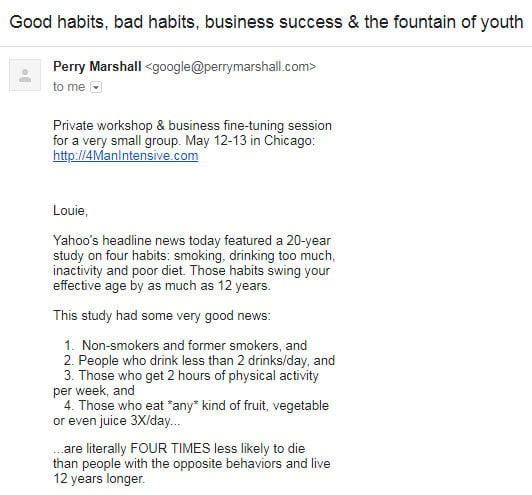
Case 2: Use of Humor/Allegory
Email marketing favors the clever, and this message from Grammarly is a great example. To emphasize the benefit of spell-checking software, the email visually alludes to the alphabet. By turning the “A” into rocket exhaust, the brand emphasizes the importance and adventure of your grammar journey. Grammarly is witty and helps engage readers for those few critical seconds.
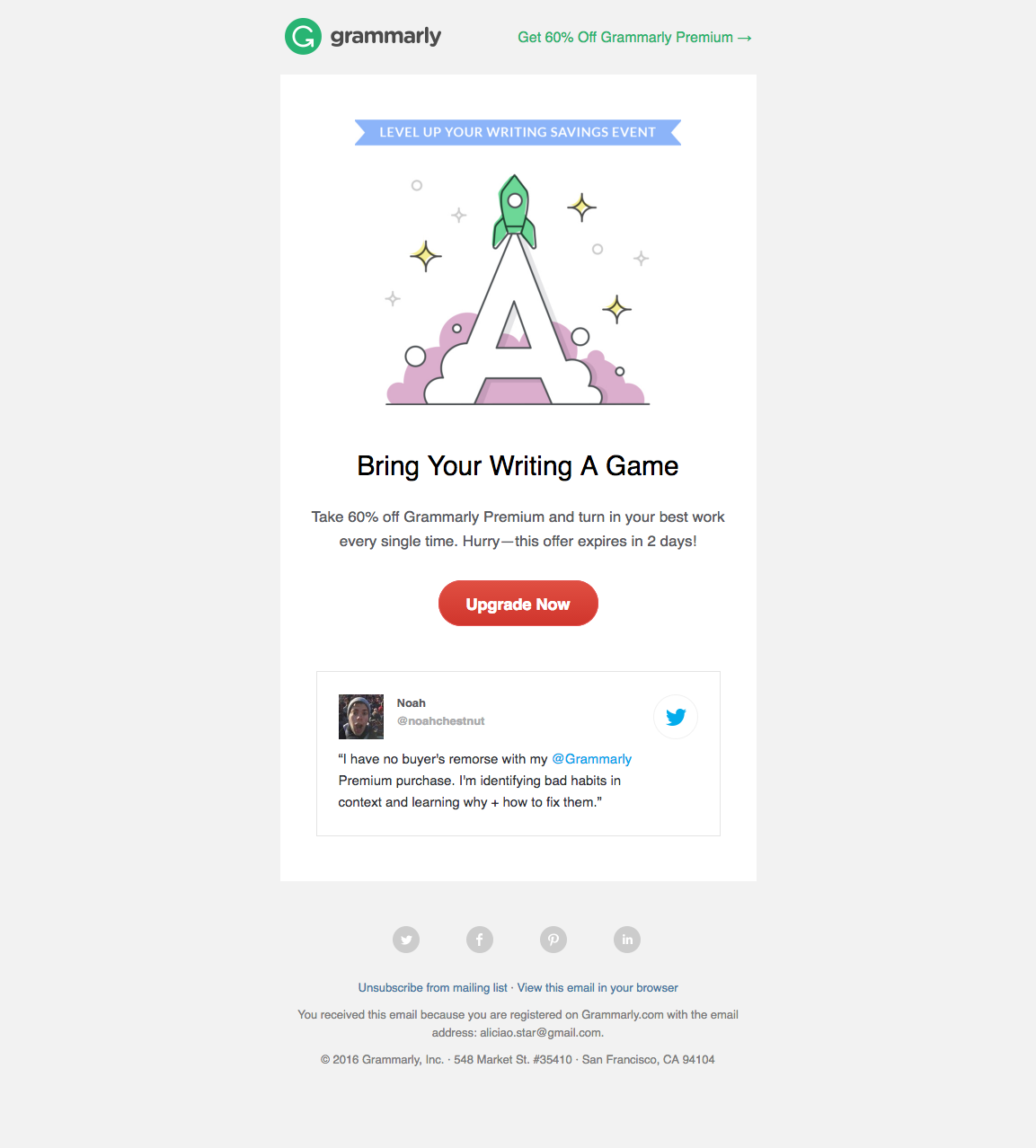
Image Source
Remember: The use of humor is tricky and can backfire if executed poorly. Make sure any humor or allegory is something everyone can understand.
Case #3: Housekeeping
Email marketing isn’t all about the welcome — some goodbyes are in order, too. Cleaning up your list is one step toward qualifying leads for higher conversions down the funnel.
Framebridge makes sure its list is updated by sorting out inactive subscribers.
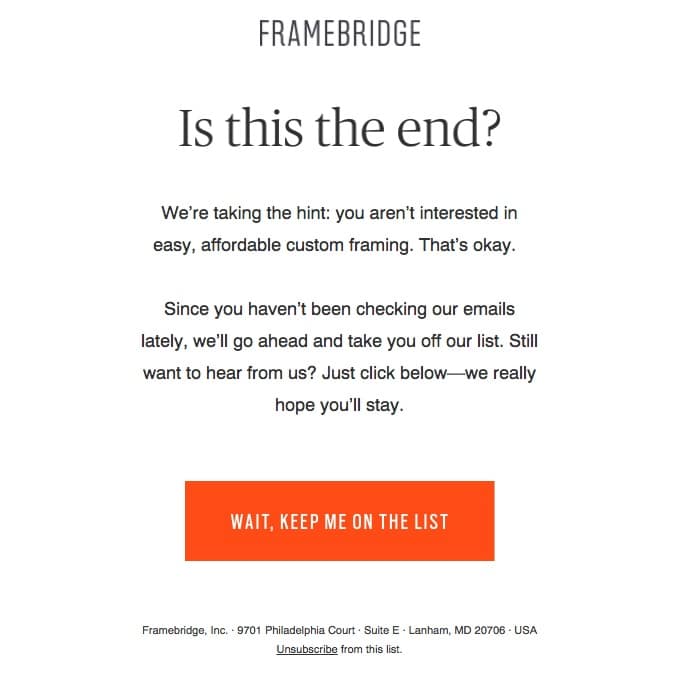
Image Source
Pro tip: Breakup emails like the one above are a great way to reengage folks on your list and clean out inactive emails.
The 10 Best Lead Generation Strategies
In this post, we’ve shared best practices for different types of lead generation. Below are best practices that work across channels. Put these best practices into action, and maximize your lead generation.
1. Target the right audience.
Know your buyer personas. In B2B, your audience could be different people in different departments. Often, you don’t have a single audience, but micro-audiences with varying interests and pain points.
2. Create lead magnets.
Develop content or offers that pique the interest of your target audience. The best lead magnets use NLP techniques in marketing, such as, clear, tangible benefit, urgency, exclusivity, social proof, authority, and immediate gratification.
3. Explore new lead channels.
Search, social media, and top media sites are unsurprisingly crowded with high-value sponsorships. You can, however, discover unique PPC channels and similar third-party marketplaces for your industry. Because these sites cater to your customers, they tend to have higher conversion rates and dominate high-value general organic search keywords.
4. Capture the right information.
The rule of thumb is to get only the most basic customer data at the initial stage (e.g., name and email address) and, as you work the lead down the pipeline, ask for a little more data.
5. Score, sort, and segment leads.
Not all leads are valuable and not all have the same value. Based on your metrics, run a lead scoring tool to sort leads into proper segments. This will let you target your micro-audiences with personalized messages and offers. Today’s marketing automation software, like HubSpot, are very powerful and can automate this important process.
6. Blog consistently.
Regularly posting content improves your SEO, authority, brand awareness, industry stickiness, and, generally, your web presence.
7. Integrate organic and PPC.
These two marketing channels complement each other. When executed together, they can fill in the gaps. For example, you can run paid search for any organic keywords for which you’re not ranking highly.
8. Benchmark your conversion rates.
Don’t be content with seeing your rates improve month-to-month or year-to-year. Compare them with the competition. That’s the true picture of your business’ competitiveness.
9. Automate.
The best marketing automation will put your lead generation into a workflow. The software can then capture leads from your campaign, score them, nurture them throughout the lead pipeline, and qualify them. Then, your leads will be ready for your sales team.
10. Go mobile.
Mobile marketing is the next battlefield for B2B leads. More business buyers are using their smartphones in the purchase journey. Make sure your forms, emails, websites, and ads are optimized for mobile.
Those are some of the best B2B lead generation campaigns and techniques at your fingertips. Apply or reapply these time-tested techniques and share with us how much they improve your lead volume.
Credit: Source link


